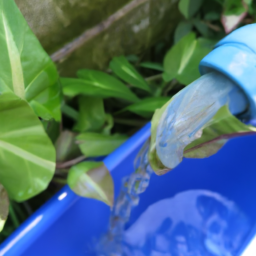How To Use Kitchen Waste Water For Gardening
Table of Contents []
How To Use Kitchen Waste Water For Gardening
Introduction
Water is the basis of all life and is essential for every living organism. This means, however, that it is of critical importance to conserve it and use it judiciously. Although traditionally, this conversation focuses on conserving freshwater resources, we can also look at alternative sources of freshwater such as kitchen waste water for a variety of jobs around the house. In this article, we discuss the particulars of using kitchen waste water for gardening in the home.
Water Conservation
It is essential to conserve water, particularly when it comes to gardening. Watering plants and maintaining their condition can be quite laborious and take up a great deal of time and energy. It is therefore advisable to be as prudent as possible with the water we use. This is especially important when it comes to kitchen waste water as it would otherwise be discarded, it is best to learn how to repurpose it for various home-related tasks.
Efficient Kitchen Waste Water Utilization
Using kitchen waste water for gardening is an efficient means of water conservation. As it would otherwise be channelled away, by reusing it we can help reduce the economic burden on our households. The hydro-management aspect of it makes use of the weight of the water to fill tanks, which in turn supply water to the plants in the garden.
Reusing Kitchen Waste Water
The reusing of kitchen waste water involves using a two-stage filtration system. The first stage involves purifying the water and making it safe to use in gardening. The second stage involves passing the water through a number of containers that provide nutrition and hydration for plants. Also, the kitchen waste is also passed through a drainage system before it is put to use in the garden.
Benefits of Kitchen Waste Water in Gardening
Using kitchen waste water for gardening has numerous benefits. Not only does it conserve water and lead to a lesser water cost, but it also helps to reduce pollution from runoff into fresh water sources. Furthermore, it also reduces the amount of plastic or synthetic waste that needs to be disposed of in a landfill. Moreover, it is a great way to make use of existing resources instead of buying new ones.
Incorporating Kitchen Waste Water Into Gardening
Incorporating kitchen waste water into gardening is fairly straightforward. All that is required is a water tank that is sufficiently large enough to hold the kitchen waste water. A valve is installed at the bottom of the tank, which is connected to a hose that disperses the water into the garden. From there, the plants can use the water as they need it.
The Perils of Using Kitchen Waste Water
Using kitchen waste water for gardening comes with certain risks. If wastewater is not properly filtered and purified, it can lead to contamination of the soil or other water sources. It is also possible that bacteria and viruses from the cooking process could also be present in the water. As such, it is important to always use filtered water and exercise caution to avoid potential negative effects of using kitchen waste water.
In Summary
Using kitchen waste water for gardening is an efficient means of water conservation and can provide numerous benefits for households. However, it is important to make sure that the water is properly filtered and purified first in order to avoid any potential contamination of the soil or other water sources. Only then can it be repurposed for various tasks around the house, such as gardening.

Previous Page
Next Page
